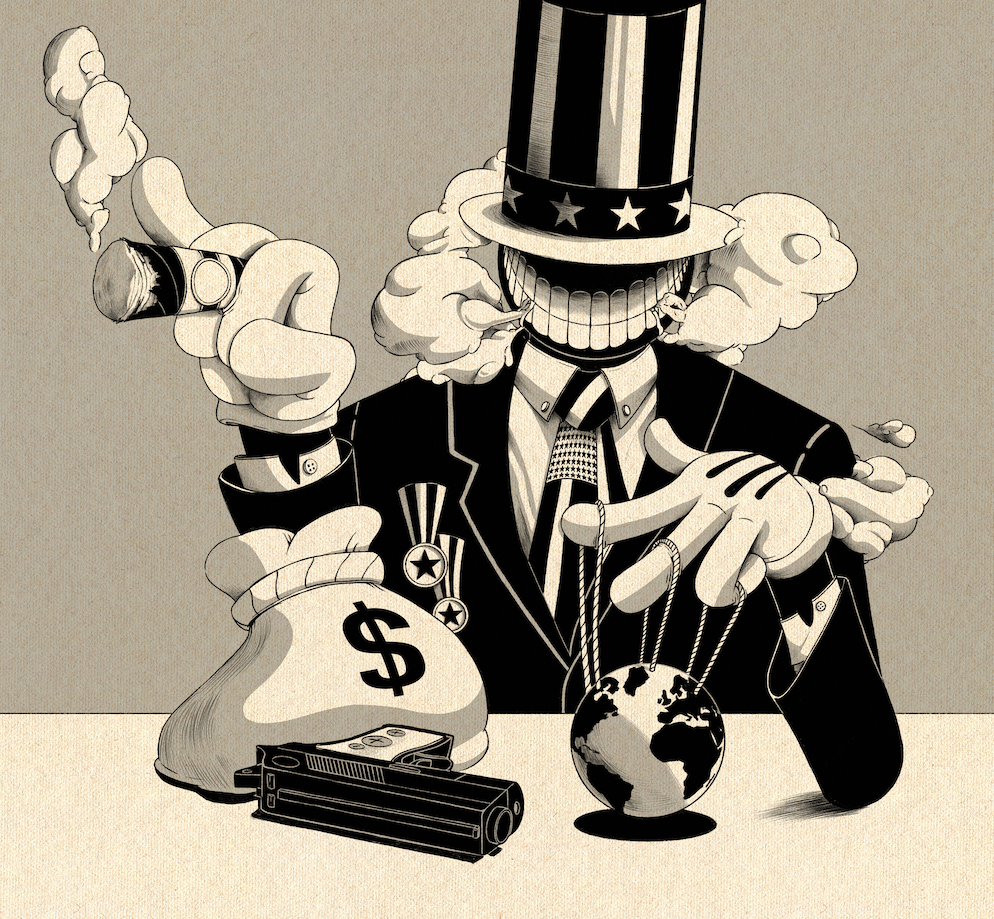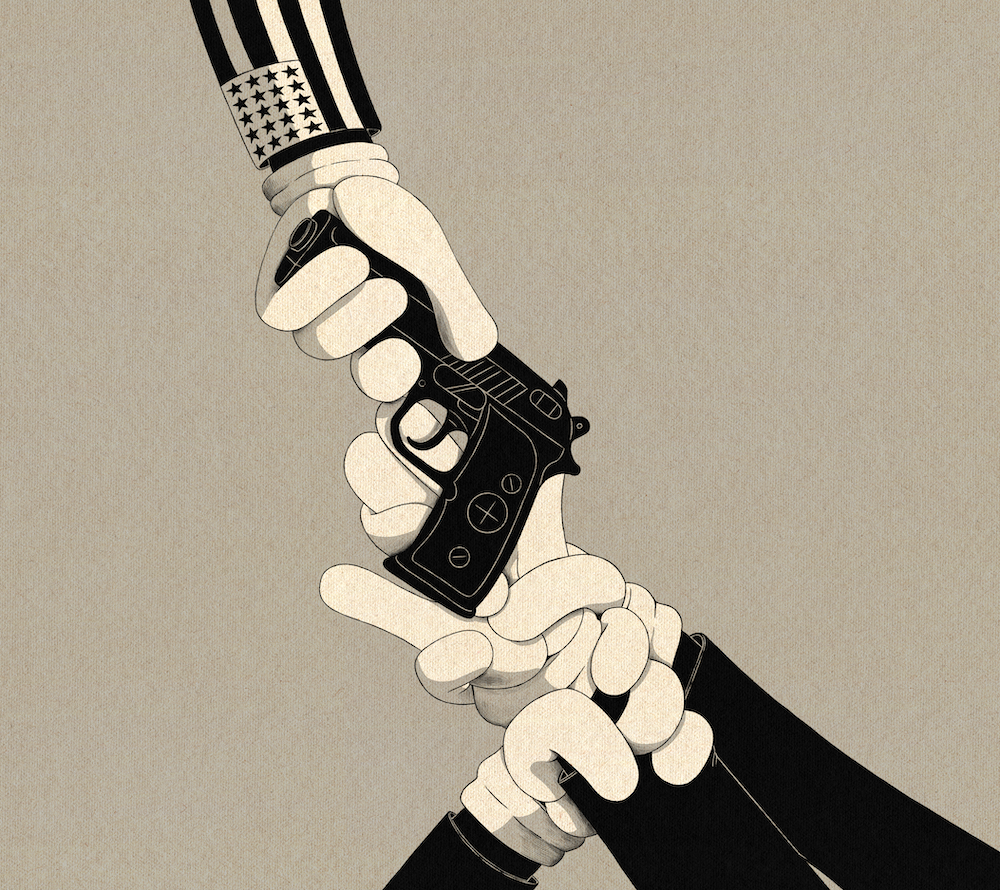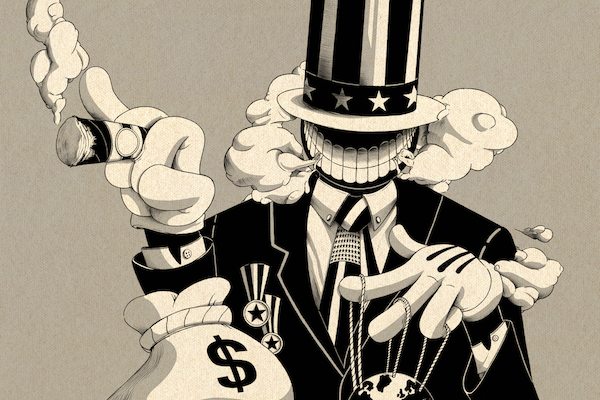Written by Benjamin Greennagel
Illustrated by Ernest Brants

In the collective memories of many nations, the United States takes the role of the top cop, the mega-entrepreneur, the manifestation of military might. In the collective memories of its citizens, the U.S. is the bane of fascism, the heroes of the World War and the loudest advocate for civil rights in what it calls “third-world countries” — that is, up until now.
The U.S. cloaks its age-old push for power in performative policies and an utter lack of action. We know that now. The federal government’s intervention in foreign and domestic affairs exhibits at best the neglect of marginalized voices and at worst the violent oppression of its own people. “What’s going on?” is a question we often hear, often in times of social upheavals, or, to the uninformed observers, times of utter madness. The media circus rarely helps, what with their tangled knots of esoteric explanations. But take a step back and one could see the patterns, the motives and, most importantly, the beneficiaries — which oftentimes inevitably turns out to be the U.S. government. The U.S. government has time and again claimed to uphold a set of morals that values peace and independent democracies, but through methodical involvement in other nations’ conflicts, the federal government contributes to a global sense of unrest and mayhem.
A classic example can be traced back to the 1800s, during Cuba’s fight for independence from Spain. On paper, the U.S. claimed to support Cuban independence. The outcome of the war suggests that it did not. When President William McKinley made his declaration of war with Spain, he named two reasons: defense of the U.S. economy and support of Cuban independence. However, once the US was officially involved in the war, it used the conflict as an excuse to annex Hawaii. As a state, Hawaii would be used to export profitable resources like sugar as well as host a major naval base in Pearl Harbor. After the US sank a Spanish fleet in the Battle of Manila Bay, the US took the Philippines as well, which would eventually result in another war. Finally, the Spanish left Cuba — but the U.S. did not. It established more military bases there, and the true objective became apparent: the US wanted to expand its empire and claim new territories by profiting off of another country’s fight for freedom. Over a century later, American politicians would shamelessly campaign against the anti-American sentiment of the Cuban Communist revolution, and the Red wave would be branded as a threat to freedom. This same genre of politicians would go on to joyfully impose an economic blockade that, as of June 2021, is still choking the Cuban economy and contributing to the Cuban humanitarian crises. What mind-boggling chaos, caused in large parts by such a good friend of Cuban independence, or, more appropriately, Cuban isolation.
Moving closer to home, one could see the designs in domestic mayhem, too. Take the U.S. government’s response to crises in its territories, for example. In 2017, Americans were affected by three different category-four hurricanes. The first two, Harvey and Irma, respectively made landfall in Texas and Florida. Hurricane Maria was the last to hit, making landfall in Puerto Rico on September 20. This makes the insufficient disaster relief in Puerto Rico quantifiable, as it can be compared to the aid Texas and Florida received. Puerto Rico, which was already dealing with a dated power grid and a debt crisis, received around 10 percent of the amount of food distributed to Florida and 40 percent of the amount of water. Seven months later, more than 100,000 individuals were still living without power on the island. As a territory, Puerto Rico is ineligible to receive certain aid, like food stamp programs. Negligence fuels ignorance, and ignorance fuels negligence. In 2017, a poll by Morning Consultant found that nearly half of Americans didn’t know that Puerto Rico is a part of the U.S. or that Puerto Ricans are citizens. Perhaps “citizens” is a big word. How can Puerto Ricans be “American citizens” if they are not allowed to represent themselves in Congress or vote in federal elections? And how can they effectively advocate for these rights if the government, the education system and the media continue to ignore them?
Allowing individuals to suffer like this by “turning a blind eye” enables more subtle, insidious systems of violent imperialism. In recent years, the National Rifle Association has faced scrutiny for its impact on crime in foreign countries. To understand the international influence of the NRA, we must acknowledge its impact within the U.S. The NRA is among the most powerful special interest groups, influencing elections over the single issue of gun control. It endorses candidates based on their stance on this issue, and it gives candidates who are not staunchly opposed to gun control a poor “rating” and notifies its massive membership, which is suspected to have surpassed 3 million people. But the problem is not only domestic. The NRA has been lobbying in Brazil and other countries that have stricter gun control laws than the US, utilizing fear and rights to self defense as sales tactics. Meanwhile, U.S. citizens have been arrested for illegally selling guns to individuals in Latin American countries. Many of these firearms have been linked to criminal activities and rising crime rates. These rising crime rates, in turn, compel immigration to the U.S., where immigrants are detained, punished and told to go back to their own country, which the U.S. had allowed its special interest group to destabilize. American TV would solemnly broadcast about the utter mess that is the “immigration crisis,” followed just as solemnly by footage of congressmen bringing rifles to the border, advocating for violence against refugees in the name of patriotism.

It has always been this obvious. The hands that weave the tangled nets are connected to the faces smiling at the chaos. Look away from these speeches written under governmental letterheads and one can see the bona fide American pattern of strategically maintaining control over another country or group of people under the guise of diplomacy. The safety and human rights of other individuals are excuses, pawns and trade-offs for economic benefits. Through the calculated mismanagement of international as well as interracial relations, the U.S. ensures its economic superiority, and the American ruling class preserves its social superiority.
But maybe, now that we see it, we can also see those who stand against it. And maybe, we can turn our attention their way.

